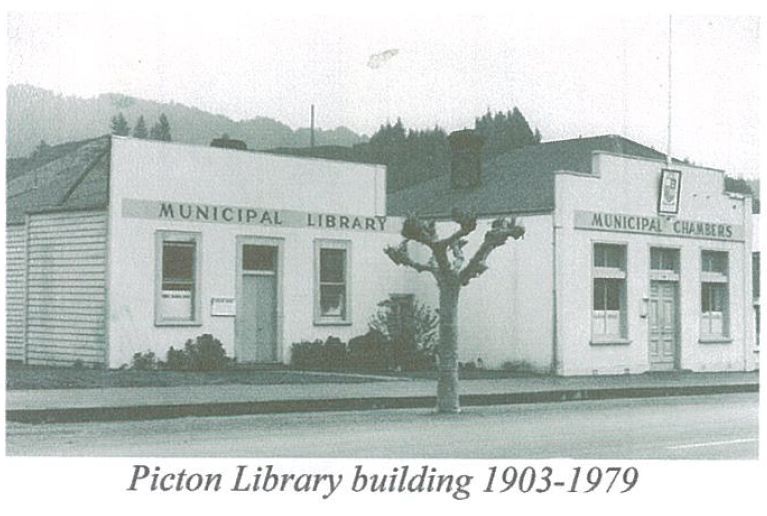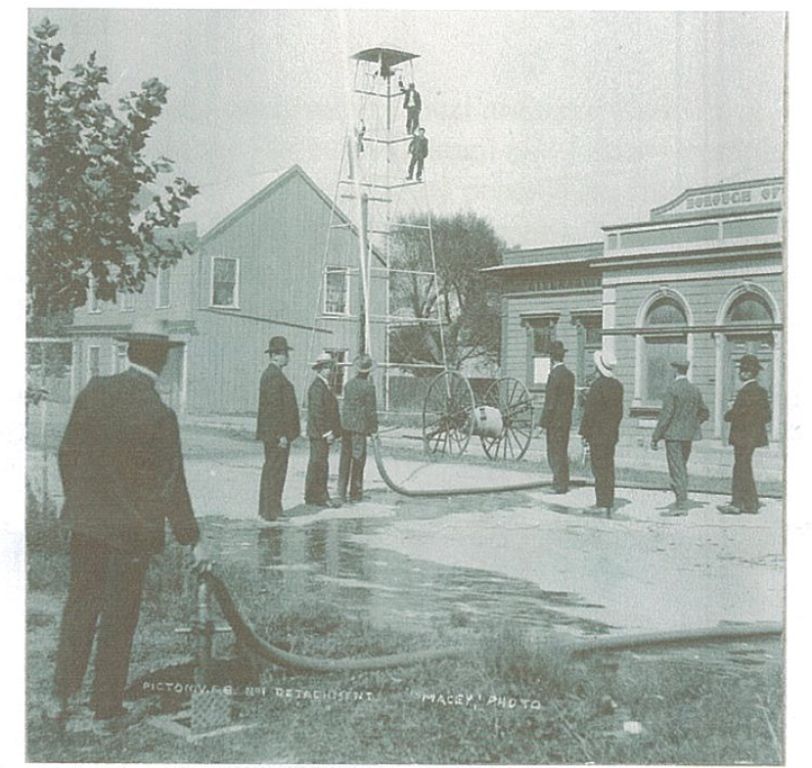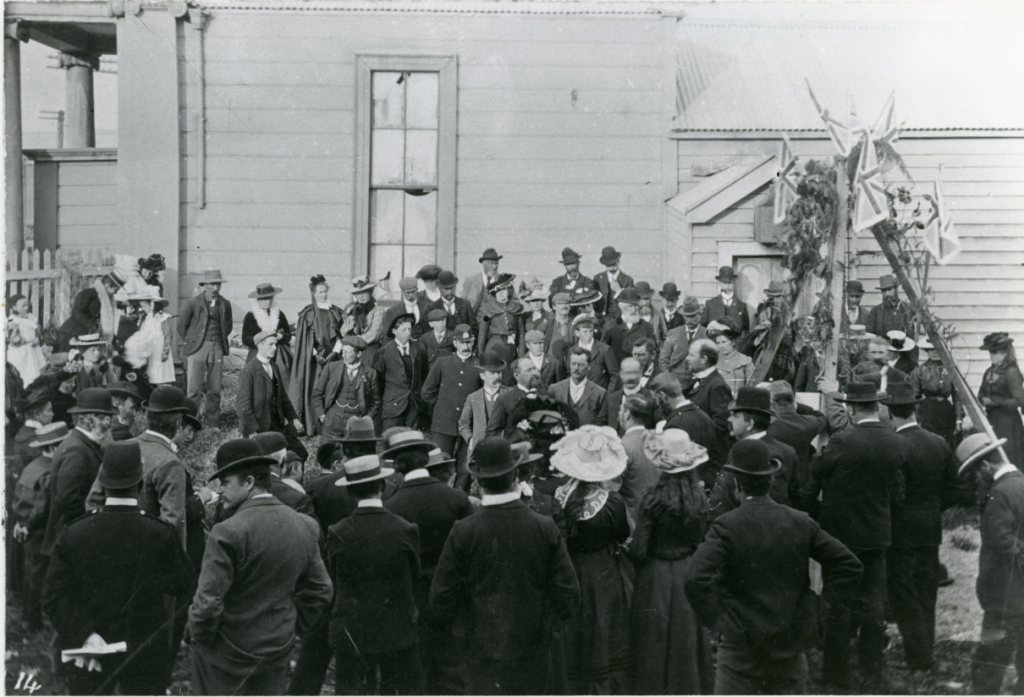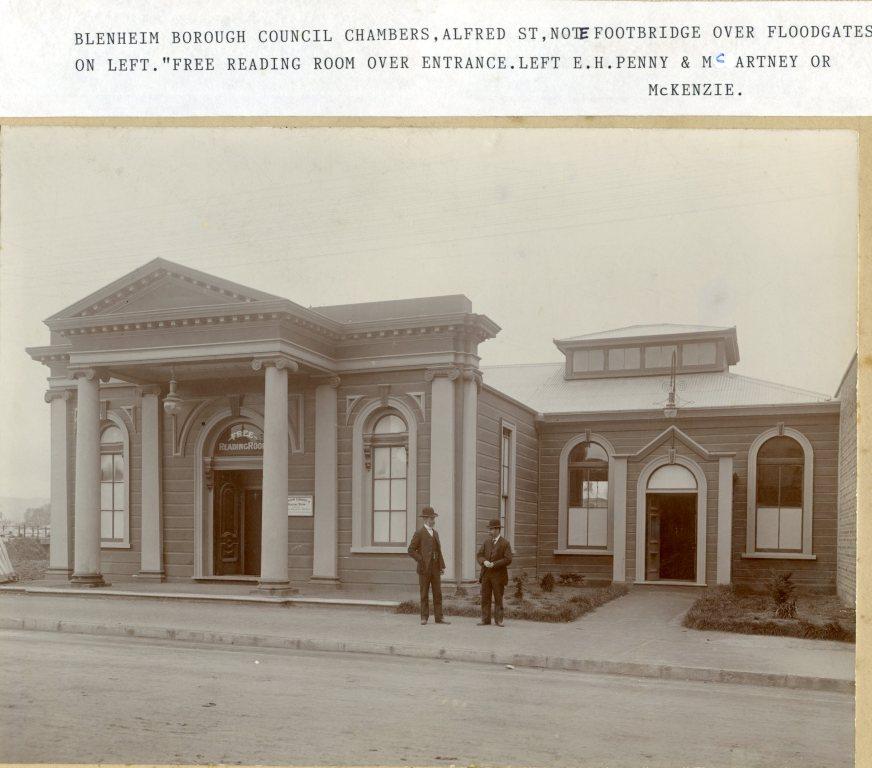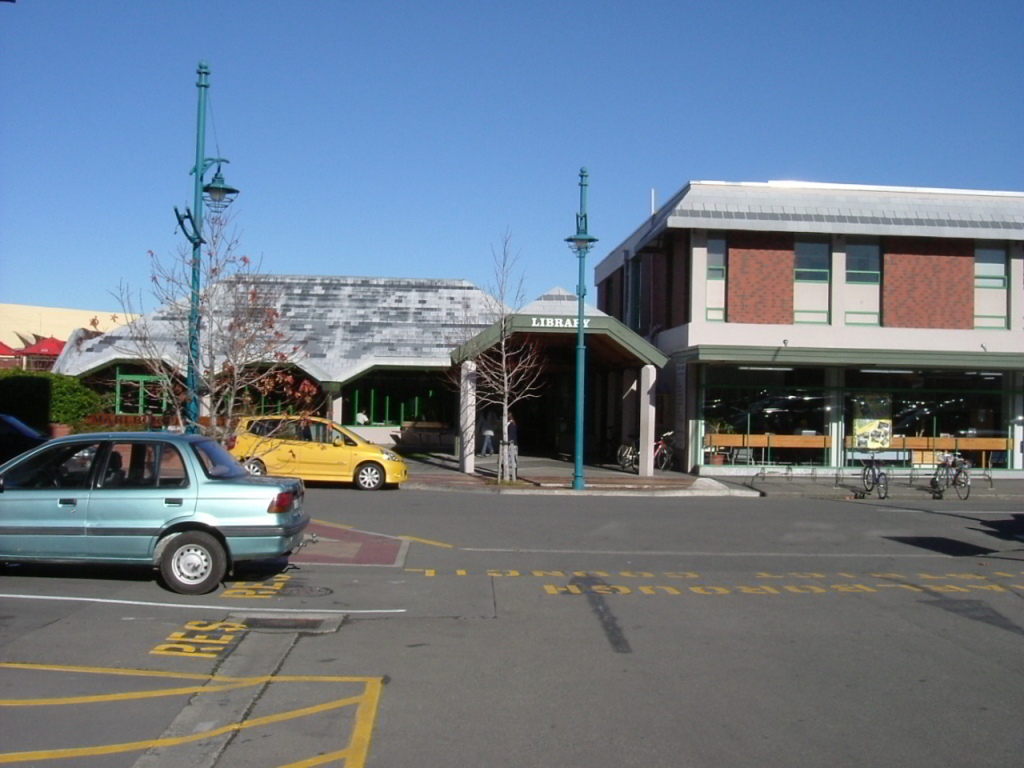Picton and Blenheim's Literary Institutes
New Zealand's early European colonists soon established a range of associations and organisations, including debating and literary societies, libraries and mechanics' institutes. 1 Picton Picton Library. Marlborough Historical Society.
New Zealand's early European colonists soon established a range of associations and organisations, including debating and literary societies, libraries and mechanics' institutes.1
Picton
Picton was the first town in Marlborough to open a library and reading room. A public meeting was held in the Waitohi Hotel in September 1859, land in the centre of town was granted and building funds were raised. The building was opened on 19 December 1859.2
Officially known as the Picton Literary Institute, it was also referred to as the Mechanic's Institute, as it aimed to provide learning materials for apprentices studying for trade exams.3
The Annual meeting of the Institute, held in January 1877, expressed the hope that books ordered from England would attract membership.4
In March 1899, a letter to the Marlborough Express said the Institute was a credit to the town, but the writer complained about younger members "kneeling on forms and shaking tables, making it impossible for a quiet reader to understand anything about him. Silence should be written up and rigidly enforced."5
The Picton Borough Council agreed to give regular financial support in 1902 (£12/annum) in exchange for building Council Chambers on the Institute's property. It was not until 1935 that the Council took full control of the library.6
The Picton Library joined the Country Library Service in 1935, ensuring a steady rotation of books.6 A new library (which included Council chambers and offices) built on the original Institute site, was opened by Picton mayor, Tom Bryant on 4 October, 1980.7
It soon became apparent that this new facility was inadequate for the needs of the community and a case was made for a new building. After years of planning, Marlborough District Council released the plans for a new facility in 2016,8 on the same site but with an increased footprint. The new library opened its doors to the public on 29 November 2017, as Waitohi Whare Mātauranga, or "Picton’s House of Knowledge". The new library and service centre includes more room for library items, a large open space for activities and events, a quiet reading room and a bookable meeting room.9
Blenheim
At the time of separation from Nelson in 1859, it was decided to establish a library and reading room at "The Beaver ". On January 6, 1860, the Marlborough Press stated the Marlborough Reading Rooms were open from 10am to 9pm. Terms were five shillings/quarter or threepence/visit.10
The rooms soon became a community meeting place with the Marlborough Press, on 2 June 1860, advertising ‘A vocal and instrumental concert consisting of comic and sentimental songs, recitations etc' held every Saturday night at the Blenheim Library.10
This institution did not prosper, but the first annual report of the Blenheim Literary Institute presented by Dr Stephen Muller, Blenheim's resident magistrate, in January 1867, reported that the Reading Room was well supplied with Colonial and English newspapers, magazines and 400 books. "Additions could soon be made to the library, if the inhabitants of Blenheim would only show more interest in such a valuable institution."10
A new addition to the Literary Institute was planned, with ‘a handsome and suitable exterior, of commodious proportions, with provision for the making of fires during the winter months'. The addition was opened in March 1880.11
While subscribers clamoured for new books in 1890, a lack of subscribers meant the committee could not afford to buy them. With land, building, book and furniture assets totalling £1351, the committee closed the Institute on 31 December, 1890. A new committee held a Garden Party to raise funds with which they bought new chairs, repapered the reading room and bought 224 new books. Membership increased to 89 subscribers.12
In 1899, a letter to the editor of the Marlborough Express described the Institute buildings as ‘a standing disgrace'. He went on to complain about "...the gaping women who assemble there to hear, the news of the day, and continue their gossip well into the hours of the night."13
The Borough Council discussed taking over the library in 1901, with the Mayor saying: "there was urgent need for a good library and reading room to give those who desired it, and many others who now congregated on the streets at night, an opportunity of reading and studying good literature."14
The foundation stone for a library and reading room was laid on the site of the original Literary Institute in 9 August 1902. The Blenheim Library committee wound up the affairs of the Institute on 30 September, 1902, and the property was transferred to the Blenheim Borough Council.15
By 1905, the borough had a population of 3500 people and a free Library containing 3500 volumes.16
In 1908, a letter to the editor complained that the reading rooms were only open three days a week and that "as is usual in country towns the library of fiction is fairly well looked after, the lover of romance being as a rule well catered for."17
A new library was opened on the original Institute and Library site (corner of Alfred and Seymour Streets) in May 1958.18 The Blenheim Library was relocated to a more spacious building a block away in June 1989. The Marlborough District Libraries took over responsibility for all libraries in the district when the Marlborough District Council was formed in November 1989.
From 2012 onwards the Council's urban design strategies reinforced the need for improved library facilities in Blenheim, as well as Picton.19 The project was initiated in 2013 as part of the Growing Marlborough process, which found the district's public art gallery and library facilities were no longer adequate. After years of planning a joint Library and Art Gallery opened its doors on 12 May 2023 - an exciting project, which was warmly received by the community. The gallery and building was officially opened with a naming ceremony at the end of June 2023.
2012 (ed. 2023)
Story by: Joy Stephens
Sources
- Hearn, T. (2009) English - Values. Te Ara - the Encyclopedia of New Zealand:
http://www.TeAra.govt.nz/en/english/13 - Kelly, H.D. (1976) As High as the Hills, Whatamango Bay: Cape Catley, p 110; Marlborough Press (1860, January 6),
The new Institute of Picton was opened. - MacDonald, J. (2009, July 24) Seaport News.
- Picton Literary Institute (1877, January 17) Marlborough Express, p.6
https://paperspast.natlib.govt.nz/newspapers/MEX18770117.2.14 - The Picton Institute (1899, March 10) Marlborough Express, p.3
https://paperspast.natlib.govt.nz/newspapers/MEX18990310.2.48 - Kelly, p.111
- Brehaut, Loreen timeline on Picton Library
- Lewis, O. (2016, February19) Picton library designs revealed. Marlborough Express on Stuff:
https://www.stuff.co.nz/marlborough-express/news/76988315/Picton-library-designs-revealed - Eder, J. (2017, July 21) New Picton Library on track to open by Christmas. Marlborough Express on Stuff:
https://www.stuff.co.nz/marlborough-express/news/94709723/new-picton-library-construction-on-track-to-open-by-christmas - Hale, A.M. (1958, May 10) Blenheim Public Library, Marlborough Express
- Hale, A.M. (1958, May 24) Blenheim Public Library, Marlborough Express
- Hale, A.M. (1958, June 7) Blenheim Public Library, Marlborough Express
- Our literary Institute (1899, May 5) Marlborough Express, p.3
https://paperspast.natlib.govt.nz/newspapers/MEX18990505.2.31 - The Literary Institute property (1902, January 20) Marlborough Express, p.4
- Hale, A.M. (1958, June 21) Blenheim Public Library, Marlborough Express.
- Civic Institutions. In The Cyclopedia of New Zealand [Nelson, Marlborough & Westland Provincial Districts].
http://nzetc.victoria.ac.nz/tm/scholarly/tei-Cyc05Cycl-t1-body1-d2-d5-d14.html? - Blenheim Literary Institute (1908, February 7) Marlborough Express, p.5
https://paperspast.natlib.govt.nz/newspapers/MEX19080207.2.33 - Hale, A.M. (1958, June 21) Blenheim Public Library, Marlborough Express
- Personal Communication, Glenn Webster, Marlborough District Libraries manager, 6 November, 2012.
Further Sources
Books
- Beverley, A. (1969) The First Hundred, the story of the Borough of Blenheim 1869-1969. Blenheim (N.Z.). Borough Council, pp.10-11
http://www.worldcat.org/oclc/112792 - MacDonald, C.A. (1933) Pages from the past: some chapters in the history of Marlborough. Blenheim, N.Z.: H.Duckworth (E.H.Penny and Co), pp.311-12
http://www.worldcat.org/oclc/35012324 - McIntosh, A.D. (Ed.) (1940) Marlborough a provincial history. Blenheim, N.Z.: Marlborough Provincial Historical Committee, p.36
http://www.worldcat.org/oclc/4654822
Newspapers
Articles in Papers Past:
- Picton Literary Institute (1877, January 17) Marlborough Express, p.6
http://paperspast.natlib.govt.nz/cgi-bin/paperspast?a=d&cl=search&d=MEX18770117.2.14 - The Literary Institute (1889, January 19) Marlborough Express, p.3
http://paperspast.natlib.govt.nz/cgi-bin/paperspast?a=d&cl=search&d=MEX18890119.2.28 - The Literary Institute (1899, February 3) Marlborough Express, p.3
http://paperspast.natlib.govt.nz/cgi-bin/paperspast?a=d&cl=search&d=MEX18990203.2.39 - The Picton Institute (1899, March 10) Marlborough Express, p.3
http://paperspast.natlib.govt.nz/cgi-bin/paperspast?a=d&cl=search&d=MEX18990310.2.48 - The Literary Institute (1899, May 2) Marlborough Express, p.3
http://paperspast.natlib.govt.nz/cgi-bin/paperspast?a=d&cl=search&d=MEX18990502.2.34 - Our literary Institute (1899, May 5) Marlborough Express, p.3
http://paperspast.natlib.govt.nz/cgi-bin/paperspast?a=d&cl=search&d=MEX18990505.2.31 - The Literary Institute (1901, June 8) Marlborough Express, p.4
http://paperspast.natlib.govt.nz/cgi-bin/paperspast?a=d&cl=search&d=MEX19010608.2.41 - Blenheim Borough Loan (1902, April 26) West Coast Times, p.2
http://paperspast.natlib.govt.nz/cgi-bin/paperspast?a=d&cl=search&d=WCT19020426.2.9.1.1 - The Literary Institute (1903, May 22) Marlborough Express, p.3
http://paperspast.natlib.govt.nz/cgi-bin/paperspast?a=d&d=MEX19030522.2.34 - Picton (1906, June 16) Marlborough Express, p.3
http://paperspast.natlib.govt.nz/cgi-bin/paperspast?a=d&cl=search&d=MEX19060616.2.48 - Blenheim Literary Institute (1908, February 7) Marlborough Express, p.5
http://paperspast.natlib.govt.nz/cgi-bin/paperspast?a=d&d=MEX19080207.2.33 - Literary Institute (1909, September 24) Marlborough Express, p.8
http://paperspast.natlib.govt.nz/cgi-bin/paperspast?a=d&cl=search&d=MEX19090924.2.50 - Orchestral concert (1911, June 7) Marlborough Express, p.8
http://paperspast.natlib.govt.nz/cgi-bin/paperspast?a=d&d=MEX19110607.2.48.7 - Picton (1912, February 14) Marlborough Express, p.5
http://paperspast.natlib.govt.nz/cgi-bin/paperspast?a=d&cl=search&d=MEX19120214.2.16.14 - Picton (1912, May 15) Marlborough Express, p.5
http://paperspast.natlib.govt.nz/cgi-bin/paperspast?a=d&cl=search&d=MEX19120515.2.20.13
Websites
- Marlborough Public Libraries. Retrieved 18 November 2012:
http://www.marlboroughlibraries.govt.nz
